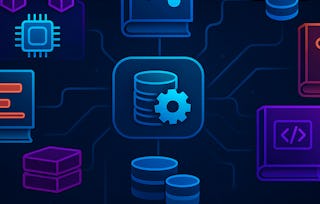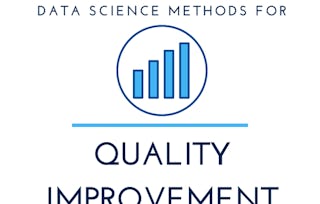This course consists of four modules covering some of the more in-depth and advanced areas of database technologies, followed by a look at the future of database software and where the industry is heading.

Advanced Topics and Future Trends in Database Technologies

Advanced Topics and Future Trends in Database Technologies
This course is part of Databases for Data Scientists Specialization


Instructors: Di Wu
8,753 already enrolled
Included with
78 reviews
Recommended experience
What you'll learn
In-depth and advanced areas of database technologies
The future of database software and where the industry is heading
Understand and differentiate four leading NoSQL implementations: MongoDB, Cassandra, Redis, Neo4j.
Skills you'll gain
Details to know

Add to your LinkedIn profile
5 assignments
See how employees at top companies are mastering in-demand skills

Build your subject-matter expertise
- Learn new concepts from industry experts
- Gain a foundational understanding of a subject or tool
- Develop job-relevant skills with hands-on projects
- Earn a shareable career certificate

There are 4 modules in this course
In this module we will take a deeper look into the internals of DBMS software to better understand how it works. We will examine the role of the DBA (Database Administrator), the Data Scientist, the Data Architect, and other career paths in the realm of database technologies. This module covers DBMS essentials such as concurrency management, backup & recovery, and transaction logging.
What's included
6 videos2 readings3 assignments1 peer review1 discussion prompt
We have learned to design a Relational Database around the typical transactions or activities a business might have. However, in case we need to analyze data, rather than collect data, we need to create a database for the subject of interest to support decision making. In this module, we are going to learn a different perspective of organizing the data, Data Warehouse, or Online Analytical Processing.
What's included
5 videos1 peer review
We are in the era of data explosion. While relational databases are still widely used, we are having new problems to deal with data that is different than the one we have been organizing. This new type of data, with 10 V's in the definition, is called Big Data. We are going to explore the definitions, the challenges, and the architecture of the Big Data in this module.
What's included
4 videos1 peer review
Although relational database software has been in use for decades, relational database systems still command a huge share of the database software marketplace. However, with the more recent explosion of Big Data, relational systems are struggling to keep up. Big Data has opened the door for non-relational database solutions ("NoSQL") to capture marketshare from relational systems. In this module we will take a deeper look into the most popular NoSQL database technologies.
What's included
6 videos2 assignments1 peer review
Earn a career certificate
Add this credential to your LinkedIn profile, resume, or CV. Share it on social media and in your performance review.
Build toward a degree
This course is part of the following degree program(s) offered by University of Colorado Boulder. If you are admitted and enroll, your completed coursework may count toward your degree learning and your progress can transfer with you.¹
Instructors

Offered by
Explore more from Data Management

Birla Institute of Technology & Science, Pilani
 Status: Free Trial
Status: Free TrialUniversity of Colorado Boulder
 Status: Free Trial
Status: Free Trial Status: Free Trial
Status: Free TrialUniversity of Colorado Boulder
Why people choose Coursera for their career

Felipe M.

Jennifer J.

Larry W.

Chaitanya A.
Learner reviews
- 5 stars
75.64%
- 4 stars
17.94%
- 3 stars
2.56%
- 2 stars
2.56%
- 1 star
1.28%
Showing 3 of 78
Reviewed on Jun 18, 2022
The course work and assignments are clear and adequate.
Reviewed on Oct 30, 2022
Good overview of database technologies, especially NoSQL databases. But it's pretty high level.
Reviewed on Jun 1, 2022
Great course, very clear explanation of concepts and great instructors!

Open new doors with Coursera Plus
Unlimited access to 10,000+ world-class courses, hands-on projects, and job-ready certificate programs - all included in your subscription
Advance your career with an online degree
Earn a degree from world-class universities - 100% online
Join over 3,400 global companies that choose Coursera for Business
Upskill your employees to excel in the digital economy
Frequently asked questions
To access the course materials, assignments and to earn a Certificate, you will need to purchase the Certificate experience when you enroll in a course. You can try a Free Trial instead, or apply for Financial Aid. The course may offer 'Full Course, No Certificate' instead. This option lets you see all course materials, submit required assessments, and get a final grade. This also means that you will not be able to purchase a Certificate experience.
When you enroll in the course, you get access to all of the courses in the Specialization, and you earn a certificate when you complete the work. Your electronic Certificate will be added to your Accomplishments page - from there, you can print your Certificate or add it to your LinkedIn profile.
Yes. In select learning programs, you can apply for financial aid or a scholarship if you can’t afford the enrollment fee. If fin aid or scholarship is available for your learning program selection, you’ll find a link to apply on the description page.
More questions
Financial aid available,

